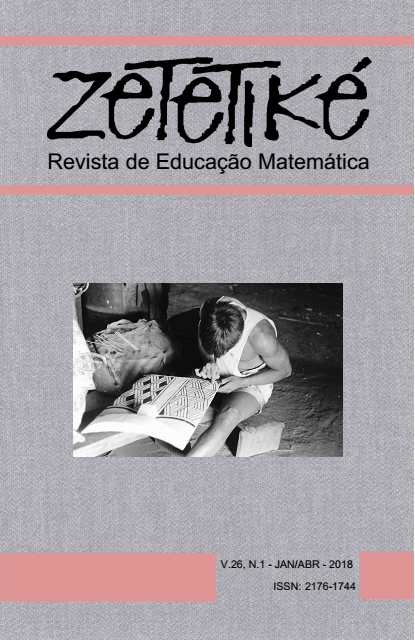Abstract
In this article we present the body painting practices of the patrilineal exogamous clan halves - Doi and Wahirê,
of the indigenous Xerente people, whose objective was to investigate the mathematics potentialized in the
symbologies found in the body paintings Doi and Wahirê; so we questioned in what terms the symbologies
found in the bodily paintings of indigenous belonging to the patrilineal exogamous halves Doi and Wahirê
constitute a system of Xerent mathematics. The theoretical articulations were made based on the theory of
communities of practice proposed by Wenger (2001). The research was developed through the qualitative
ethnographic research approach. Information gathering took place in the community contexts of Porteira and
Salto villages, through observing to participate and to participate to observe the indigenous in communities of
practice. The analyzes on these symbologies indicate possibilities of investigating studies of geometries, from
the clan drawings of each exogamic half of this people.
References
Bauman, Z. (2003). Comunidade: a busca por segurança no mundo atual. Trad. Plínio Dentzien. Rio de Janeiro: Zahar.
Brasil (2005). Secretaria de educação continuada, alfabetização e diversidade. Referencial Curricular Nacional para as Escolas Indígena - RCNEI. 2. ed. Brasília: MEC/SECADI.
D’ambrosio, U. (2004). Etnomatemática e educação: alguns elementos de reflexão. In G. Knijnik, F. Wanderer & J. C. Oliveira, Etnomatemática: currículo e formação de professores. (pp. 39-52). Santa Cruz do Sul: Edunisc.
Guber, R. (2012). La etnografia: método, campo e reflexividad. Buenos Aires: Siglo Veintiuno. (Mínina).
Lave, J. (2001). La práctica del aprendizaje. In S. Chaiklin & J. Lave (Orgs.), Estudiar las prácticas: perspectivas sobre actividad y contexto. (pp. 15 – 45). Buenos Aires: Amorrortu. (Educación Agenda Educativa).
Lave, J. & Wenger, E. (1991). Situated learning: legitimate peripheral participation. Cambridge: Cambridge University Press.
Melo, E. A. P. de. (2016). Sistema Xerente de Educação Matemática: negociações entre práticas socioculturais e comunidades de prática. Tese (Doutorado em Educação em Ciências e Matemáticas) – Universidade Federal do Pará, Belém.
Miguel, A. & Mendes, I. A. (2010). Mobilizing histories in mathematics teacher education: memories, social practices, and discursive games. Revista ZDM mathematics education, (42), (381-392). Disponível em: http://link.springer.com/article/10.1007/s11858-010-0255-8.
Oliveira, M. M de. (2010). Como fazer pesquisa qualitativa. 3. ed. rev. amp. Petrópolis: Vozes.
Wenger, E. (2001). Comunidades de práctica: aprendizaje, significado e identidad. Barcelona: Editorial Paidos.
Wenger, E., Mcdermott, R. & Snyder, W.M. (2002). Cultivating communities of practice. Harvard Business Schoo Press, 2002.

This work is licensed under a Creative Commons Attribution-NonCommercial-NoDerivatives 4.0 International License.
Copyright (c) 2018 Zetetike

